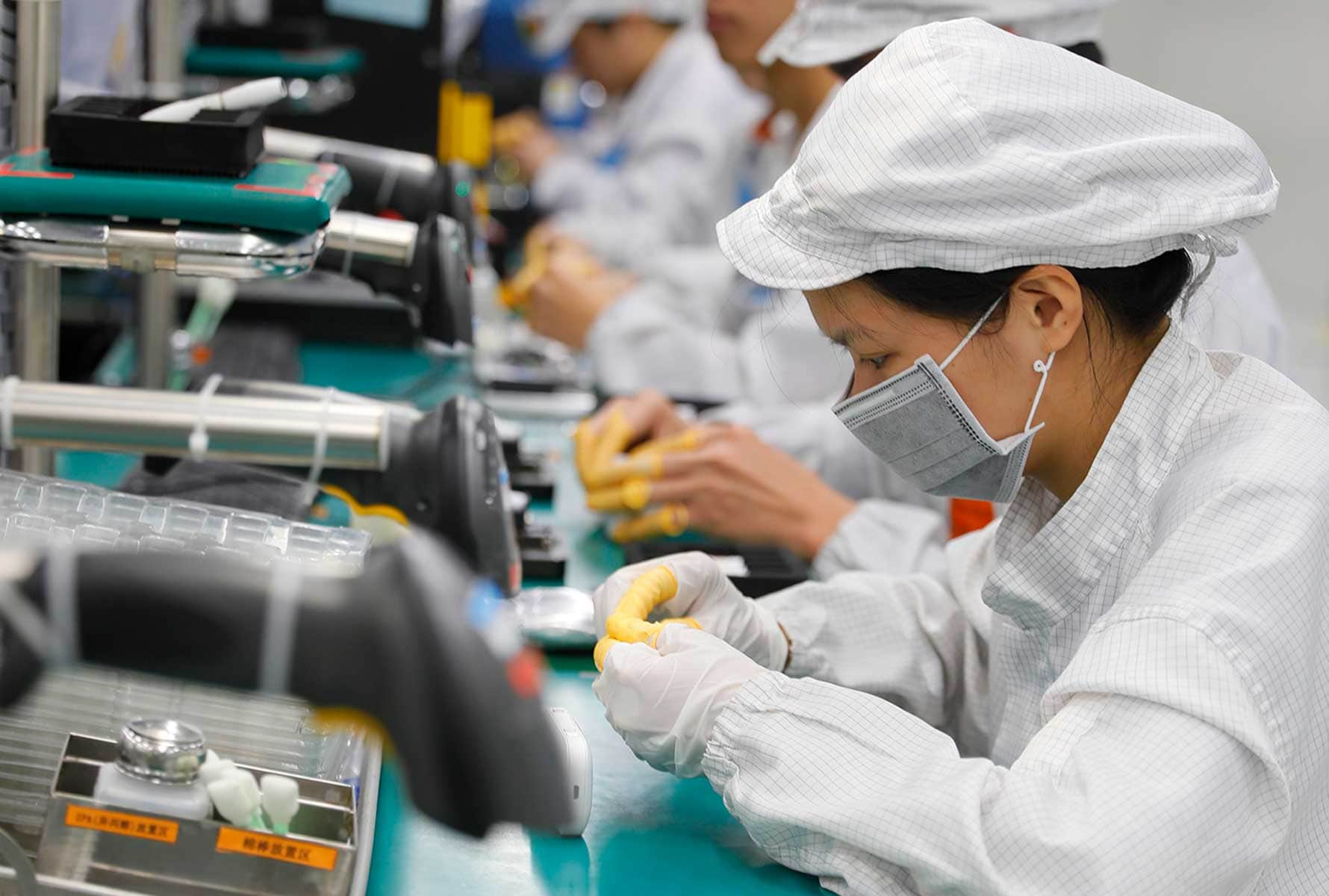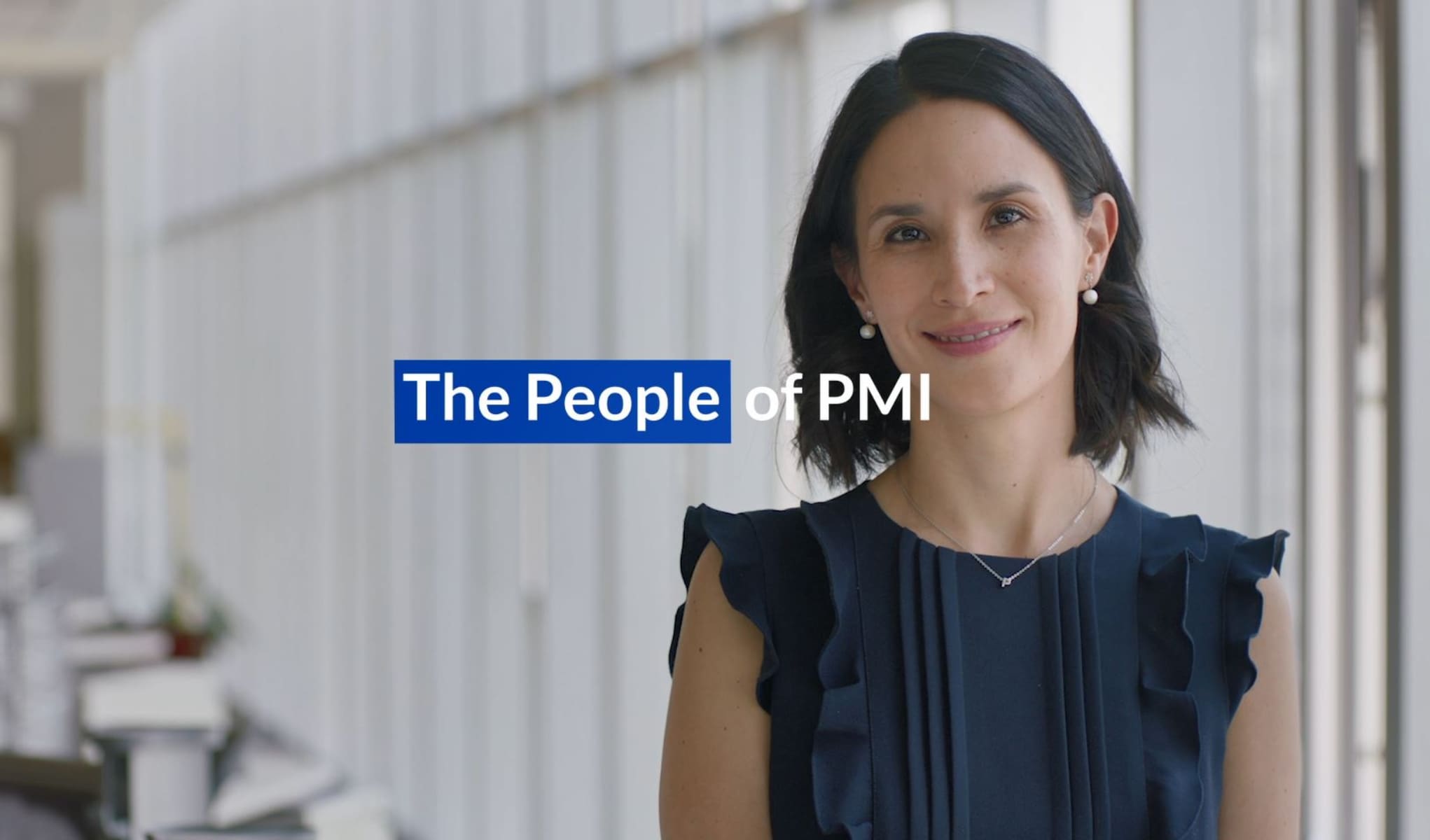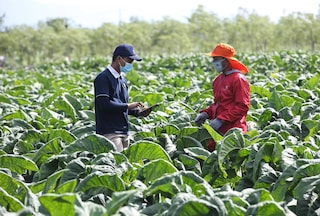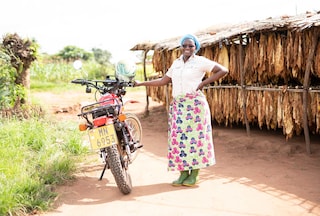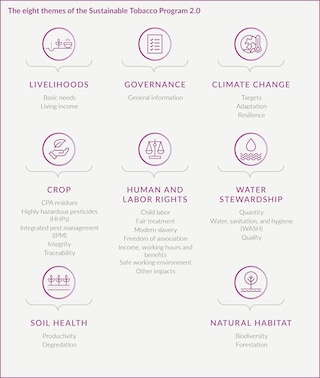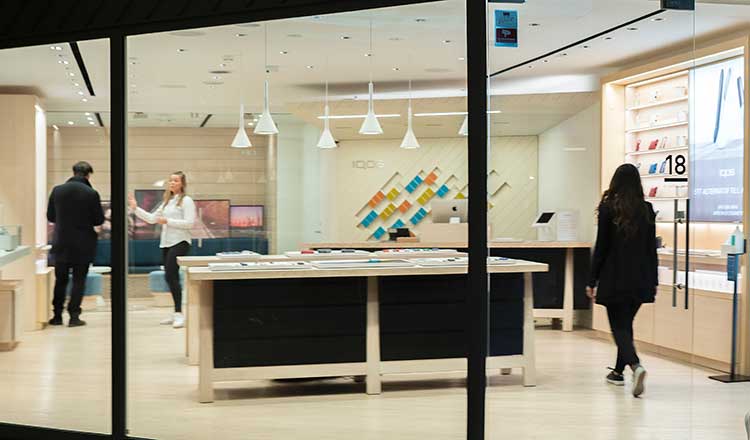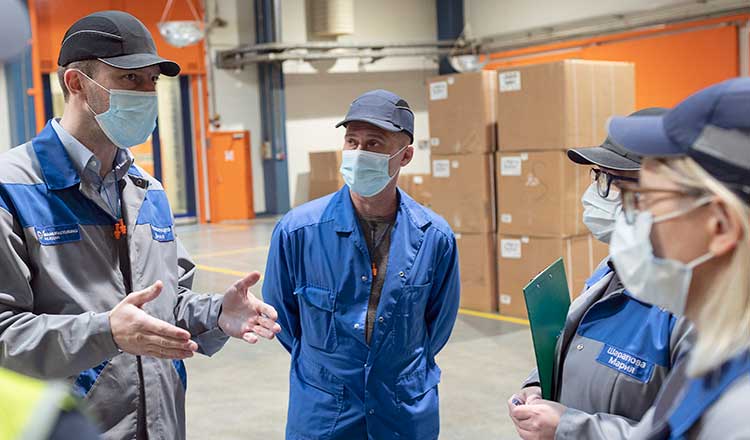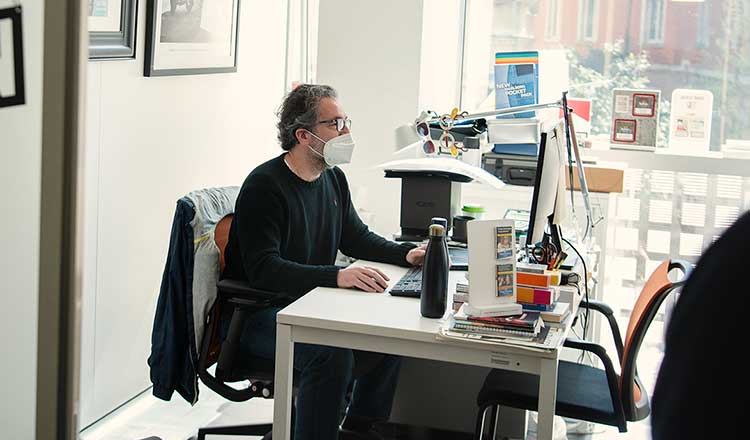Impact of COVID-19 on our activities in 2020
Monitoring the sustainability performance of our critical suppliers
We started onboarding our critical non-tobacco suppliers in our due diligence STEP platform in 2019, focusing first on our direct materials and electronics supply chains. In 2020, we exceeded our target of assessing suppliers representing 90 percent of our spend in those categories.
By the end of the year, 113 critical tier-1 suppliers, representing 95 percent of our critical supplier spend on the direct materials and electronics categories, had completed self-assessments. Of them, 45 percent were shown to be compliant with PMI’s RSP, while for 17 percent, the self-assessment triggered targeted follow-up actions. The assessments revealed significant gaps for the remaining 38 percent of suppliers, mainly related to resource consumption and waste minimization, freedom of association, and risk of child labor. In a number of cases, desktop audits were undertaken—as on-site audits were not possible due to the COVID-19 pandemic.
In 2020, we completed 29 desktop audits: 93 percent of suppliers improved their performance compared with the results of their self-assessment. This indicates that the guidance provided by auditors at the time of the desktop audits improves the quality and completeness of the answers provided by respondents to our STEP questionnaire. Overall, 86 percent of the suppliers that underwent the desktop audit demonstrated compliance with our RSP, while 14 percent reported significant gaps.
In parallel, we started onboarding non-tobacco suppliers in other supply chain categories. In total, suppliers representing more than 15 percent of our spend on technical procurement, R&D expenditure, and indirect materials and services completed our due diligence process by the end of the year. In 2020, we also onboarded our STEP program tier-2 suppliers with whom PMI manages the commercial relationship and holds an agreement. We covered 100 percent of the tier-2 suppliers of our board and paper direct suppliers and 92 percent of the tier-2 suppliers of electronic components (such as batteries and blades) of our electronic manufacturing suppliers.
During the year, to address our evolving needs and reflect market developments, we embarked on a reassessment of our STEP platform. We benchmarked our solution with the broader due diligence market, with the aim of leveraging state-of-the-art digital solutions aligned with best practices and standards and allowing for advanced reporting capabilities. Further, we considered how to optimize efforts for both our company and our suppliers through a collaboration-promoting tool that enables us to share assessments across companies and industries. We concluded that our current platform did not provide the functionalities and capabilities required to advance our due diligence program to the next level, and plan to start the implementation of a new solution in 2021. Our analysis also highlighted the opportunity to enhance our approach by focusing on the management of online evaluations and on-site audits through different service providers. With regard to on-site audits, we plan to select and partner with several specialized providers in 2021.
In this chapter
- Impact of COVID-19
- Monitoring the sustainability performance of our critical suppliers
- Fostering collaboration with our network of suppliers
- Focus on our electronics supply chain
- Conflict minerals
- Cobalt
- PMI’s Good Agricultural Practices program
- Monitoring GAP implementation
- Industry-wide Sustainable Tobacco Program
- Next steps

Sustainable supply chain management - topic overview
read moreDeveloping long-term effective relationships across our supply chains is most critical to success, as close collaboration and ongoing engagement with our suppliers are essential to realize the ambitious sustainability objectives we set forth.
Fostering collaboration with our network of suppliers
We dedicated a section of PMI.com to describing our company, goals, and purpose with regard to our current and potential suppliers. It also details how Procurement is organized within PMI, reinforces the expectations we have toward our suppliers regarding our RSP, and discloses some of the guidelines and general terms and conditions we build our partnerships on.
To increase awareness of sustainability in our supply chain, we held virtual events, webcasts, and training sessions with strategic suppliers globally in 2020. These events covered both general and specific topics, from supplier onboarding, to STEP, to partnering on our Zero Deforestation Manifesto and carbon footprint reduction targets. For instance, we organized two CDP training sessions for our electronics suppliers, one in English and one in Mandarin, with over 100 participants. Such activities reinforce our expectations and commitments, promote the exchange of expertise and best practices, and identify potential areas for closer collaboration.
Our suppliers play a major role in our transformation journey. Therefore, we consider it fundamental to recognize our suppliers’ excellent performance and contribution to PMI’s business goals, fostering long-term partnerships and value creation. To this end, in 2020 we launched our Global Supplier Recognition program. We recognized selected suppliers for their sustainability commitment and performance, active contribution to PMI’s value creation, and engagement in innovation. In a virtual ceremony attended by around 400 participants, five of our suppliers were awarded in the areas of sustainability, innovation, and value creation.
For the fourth consecutive year, in 2020 CDP placed PMI on the CDP Supplier Engagement Leaderboard in recognition of our efforts and progress on our supplier engagement on climate change. PMI’s Supplier Engagement Rating (SER) positions us in the top 7 percent of companies that disclosed for CDP’s full climate questionnaire. By engaging our suppliers on climate change, we aim to contribute to their transition toward a net-zero sustainable economy.
Focus on our electronics supply chain
As our company continues to transform and build new capabilities, we simultaneously look at risks inherent in specific supply chains; a key area of focus is our relatively new and expanding electronic manufacturing supply base in Asia.
As our supply base widens, we strengthen our selection and onboarding process of electronic suppliers involved in the manufacture of our smoke-free devices. For new suppliers, we collect information on their practices, ask them to complete a self-assessment questionnaire, and provide a third-party audit report and an update on any corrective actions taken as a result. We then hold an on-site management review before entering into a contractual agreement in which we include sustainability clauses and required adherence and compliance with our RSP. We then integrate the supplier into our STEP platform and due diligence program.
Our tier-1 electronics suppliers were assessed through our STEP platform in 2020 and demonstrated excellent performance by reporting practices in line with PMI standards. No follow-up action in any sustainability area was necessary from this assessment. On top of our due diligence through STEP, we monitored manufacturers’ performance via sustainability scorecards and key performance indicators. We revamped our criteria in 2020 to focus on inherent risks, such as working hours and labor rights, environmental performance, supply chain management, and overall sustainability and business integrity.
To ensure our upstream supply chain fulfills our RSP, we also onboarded and completed the STEP assessment of a total of 35 tier-2 electronics suppliers, representing over 92 percent of the spend managed by PMI with such suppliers. We conducted desktop audits on those suppliers for which the STEP assessment had revealed gaps. The audits showed improvements related to the main gaps identified, such as in the provision of personal protective equipment or emergency preparedness.
In our engagement and communication with electronics suppliers, PMI maintains a clear focus on our RSP. Beyond checking systems and monitoring progress, we aim to build capability and promote progress in the areas of human and labor rights, environmental impact, and business integrity.
Participation in multi-stakeholder initiatives
The electronics supply chain is complex and very dynamic, and it faces specific challenges.
Therefore, we engage with different stakeholders to better understand inherent risks, increase traceability of the materials used in our products, and assess how we can enhance responsible sourcing practices through collaboration. To this end, we participate in several initiatives, including the Responsible Business Alliance’s (RBA) Responsible Minerals Initiative (RMI), and continued our work on the RBA Foundation’s Responsible Workplace Program.
In addition, during 2020, we further enhanced our collaboration with industry initiatives and notably the RBA, the world’s largest industry coalition dedicated to corporate social responsibility in the electronics global supply chains. We were pleased to join the RBA as an Affiliate Member in early 2021, underscoring our ongoing commitment to sustainable sourcing in electronics, as this membership will help PMI to step-change the quality and impact of our supplier sustainability program in our electronics supply base.
In 2020, we also worked with the CDP to promote the Science-Based Targets initiative (SBTi) to our electronic suppliers. Furthermore, we continued to involve additional workers in the women’s empowerment program we launched in 2019 in partnership with Inno, a Chinese non-governmental organization (NGO), supported by external funding.
Performance highlights
PMI’s Good Agricultural Practices program
PMI defines sustainable tobacco production as the efficient and competitive production of quality tobacco in conditions that limit as much as possible the impact on the natural environment and improve the socio-economic condition of the people and communities involved in its production.
In our tobacco supply chain, production is managed in accordance with our Good Agricultural Practices (GAP). GAP was first introduced in 2002. Since then, it has been updated and improved to reflect feedback received from farmers, suppliers, and stakeholders, and to keep up with ever more demanding expectations and technological developments. PMI has initiated major revisions of GAP, introducing the Agricultural Labor Practices (ALP) Code in 2011 and ALP Step Change in 2018. GAP defines the principles and measurable standards to be met by all those who grow and supply tobacco to PMI. The principles guide suppliers and farmers toward sustainable production. We use measurable standards to measure how well the practices on the farms or at the suppliers are aligned with our principles. These principles and standards are organized around four focus areas:
- Governance: PMI expects suppliers to have in place the necessary governance, procedures, and processes to manage contracts, field technicians, visits, and training.
- Crop: The crop must meet specific criteria on quality, style, integrity, and regulatory compliance. GAP also demands that the crop is grown with the appropriate seed variety, with the correct plant nutrition, and using effective integrated pest management practices to minimize the use of crop protection agents while improving yield. Mechanization practices are also promoted.
- Environment: Tobacco farmers are encouraged to preserve, reuse, and recycle the natural resources used in tobacco production, including wood, water, and fuel.
- People: PMI is committed to eliminating child labor and other labor abuses on all farms from which we source tobacco. Our ALP Code guides our work in this regard.
GAP is mandatory for all suppliers of tobacco to PMI, as is reflected in the supply contracts of PMI and its affiliates. PMI expects all its suppliers to continuously improve the implementation of GAP principles and standards in coordination with the farmers from whom they purchase. The absence of a clear commitment to act on issues identified, or a persistent lack of action and improvement, can lead to contractual implications for both farmers and suppliers. PMI also reserves the right to terminate contracts immediately in cases of severe violations impacting people, the crop, or the environment.
Overview of our tobacco supply chain in 2020
Monitoring GAP implementation
To a large extent, responsible sourcing is achieved when relationships on the ground are strong. PMI’s Integrated Production System (IPS) connects leaf suppliers and farmers beyond the customary boundaries of a commercial relationship and enables direct technical support, agronomic advice, financial loans, and various other services. This direct contractual relationship between PMI and our leaf suppliers and farmers without intermediaries is especially important when conditions are uncertain, as it was demonstrated in 2020 during the COVID-19 pandemic. IPS—which covered 99 percent of our tobacco purchases in 2020—brought financial security to our farmers by ensuring them a guarantee of purchase for the contracted volume.
IPS is vital in providing traceability and visibility in our supply base; it enables the deployment of our GAP monitoring system down to the farm level. At the center of our system are field technicians.
Field technicians are men and women who support GAP implementation and monitor how well sustainability requirements are applied and commercial processes are working. Some 2,675 field technicians—132 employed by PMI and 2,543 by our third-party suppliers—implement GAP among the 285,900 farmers from whom we source tobacco, across 23 countries worldwide. Concurrently, they provide agronomical assistance, deliver training to farmers, identify and address labor issues, and ensure implementation of improvement plans. Field technicians facilitate progress on the ground by building relationships with the farmers and usually visiting each farm on average five to ten times during the growing season. The trust they garner is crucial to the effective implementation and monitoring of GAP and ALP; it is often their pragmatic and sensitive interventions that overcome the barriers facing a program of responsible sourcing.
In 2020, despite the COVID-19 pandemic, field technicians allowed us to monitor the implementation of GAP on all contracted farms. In a few countries facing stringent confinement measures during the crop season, farms visits were adapted and remote support was offered when needed, always respecting the governmental measures and restrictions.
For instance, in Pakistan, the local team collaborated with an external IT partner to create an automated platform communicating messages to over 6,000 farmers and workers. These messages, focused on both the ALP Code and COVID-19 prevention, have been distributed despite existing infrastructural constraints due to, sometimes, poor internet connection. In addition, this platform also spread awareness to the workers about independent grievance mechanism channels where they can confidentially report potential complaints.
Industry-wide Sustainable Tobacco Program
In parallel to our GAP program, and as an additional way to evaluate supplier performance, we have been participating since 2016 in the industrywide Sustainable Tobacco Program (STP). The program is administered by a third-party service provider and has been adopted by all major global tobacco manufacturers and their leaf suppliers. The objective of STP is to assess suppliers’ performance more consistently to drive continuous improvement in addressing systemic issues across the global tobacco leaf supply chain. At PMI, STP applies to our tier-1 suppliers, including our third-party leaf suppliers, as well as our own leaf operations. All of our sourcing origins were formally reviewed and visited between 2016 and 2018 (including on-the-ground visits to a sample of tobacco farms and a comprehensive review of suppliers’ policies, procedures, and practices by a third-party specialist in supply chain management).
In 2019 and 2020, the industry—with seven major manufacturers involved—focused on the development of a new STP standard. Following an in-depth review, the due diligence process was revised to center on five steps (identify, prioritize, respond, measure, and report) applied to eight themes and 25 topics. For guidance, the development team referred to the most relevant reference frameworks, such as the UN Guiding Principles on Business and Human Rights, ILO conventions, OECD-FAO Guidance on Sustainable Agricultural Supply Chains, 1.5 Playbook, Setting Site Water Targets, and CORESTA guidance documents, to name but a few.
The revamped program aims to foster a risk-based, impact-focused approach promoting continuous improvement and multi-stakeholder cooperation. At PMI, we also support efforts of the STP program to promote transparent communication of responsible practices across the tobacco supply chain.
2020 marked the first year of implementation of the revamped STP self-assessment questionnaires. During the year, our suppliers demonstrated high levels of engagement, and all except one completed the questionnaires. In total, those covered 98 percent of our tobacco supply chain (i.e., 49 questionnaires completed, defined by supplier, origin, and tobacco type).
Under this STP 2.0, suppliers’ self-assessments will be guided by a risk assessment, and trigger an adapted action plan centered on the eight themes listed above. A secretariat has just been selected in 2021 and will be responsible for reviewing the action plans and monitoring the implementation of the agreed improvements. Independent third-party assessors will review progress by means of an in-depth, on-the-ground assessment in the priority markets determined by the risk-based approach. We plan to pilot this new in-depth assessment concept in 2021 and target a full rollout of the new program by end of 2021. We will communicate on progress in our next report.
Pilot with Produzindo Certo in Brazil
In 2020, our affiliate in Brazil (PMB) partnered with Produzindo Certo, a local company specializing in agribusiness socio-environmental management, to pilot a project aimed at improving farming efficiency and promoting effective use of natural and human resources. We felt the need to specialize further our PMB field technicians in sustainability to better support our integrated farmers to make more impact and to reach ambitious sustainability targets in Brazil. The pilot was carried out with the participation of 123 farmers.
To execute the program, PMB divided the field technicians into two groups: “production field technicians,” who continued to support all aspects related to GAP implementation, improvements in productivity, quality, and product integrity; and the “sustainability field technicians,” who focused exclusively on the environmental and social aspects. The sustainability technicians were trained by Produzindo Certo to evaluate the farmer practices, with regard to water quality, soil erosion, native vegetation, and work safety, among other aspects. To do this, they relied on the Produzindo Certo platform, which offers all the resources and indicators necessary for diagnosing and improving farming practices from a socio-environmental standpoint. Each farm assessment highlighted both areas of strengths and areas for improvement and resulted in an individual “sustainability scorecard” broken down for social, environmental, and production aspects. Action plans were then established, tailored to each farm.
Farmers could commit on a voluntary basis to implement the action plan designed specifically for their farm and see their score improving over time as they progressed. The pilot proved valuable to gain insights into improvement areas and generated a very high acceptance level among farmers. The strength of the program comes from the independent third-party assessment conducted by specialized teams, defining action plans in agreement with the growers, and monitoring progress over time. PMB already plans to extend this program to all its contracted farmers (around 5,300 in total) by 2022 and is considering opening the initiative to tobacco suppliers and to service providers in the supply chain.
Next steps
In 2021, we plan to further enhance our sustainability programs in the supply chain.
We plan to transition our STEP due diligence platform, partnering with a leading service provider. Through this, we will be able to access and leverage the provider’s state-of-the-art digital platform and tools, and very large existing supplier base, while continuing to expand our STEP program across different spend categories in our supply chain.
We also expect to onboard PMI and our electronics suppliers in the RBA initiatives through the deployment of the coalition’s approaches, tools, and capability-building activities.
We will extend the deployment of the PMI RSP sustainability clause in suppliers’ commercial agreements, while also continuing to organize and deliver capability-building activities, both internally and with our suppliers.
We will explore opportunities to extend grievance mechanisms for workers in our supply chain, focusing first on electronics suppliers, while continuing to strengthen our programs in cobalt and conflict minerals.
In our tobacco supply chain, we will roll out the STP 2.0 program with the first in-depth assessments on the ground, and will evaluate inviting global tobacco leaf suppliers to our STEP program.

